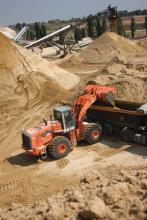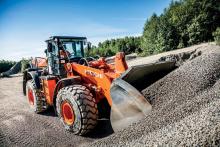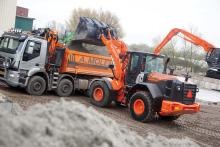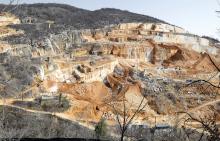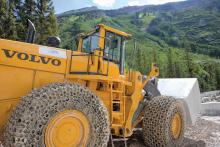The largest wheel loader in the Hitachi range has been delivered to Lasa Marmo’s Whitewater marble quarry near the village of Laas in northern Italy.
The new ZW550-5’s main function is to lift each marble block that has been extracted from the cavernous site – situated 1,600m above sea level – and transport it through a series of passageways to an outdoor storage area.
The ZW550-5 was delivered in December by Comac, a sub-dealer of the Italian Hitachi dealer for construction machinery, SCAI. The fuel
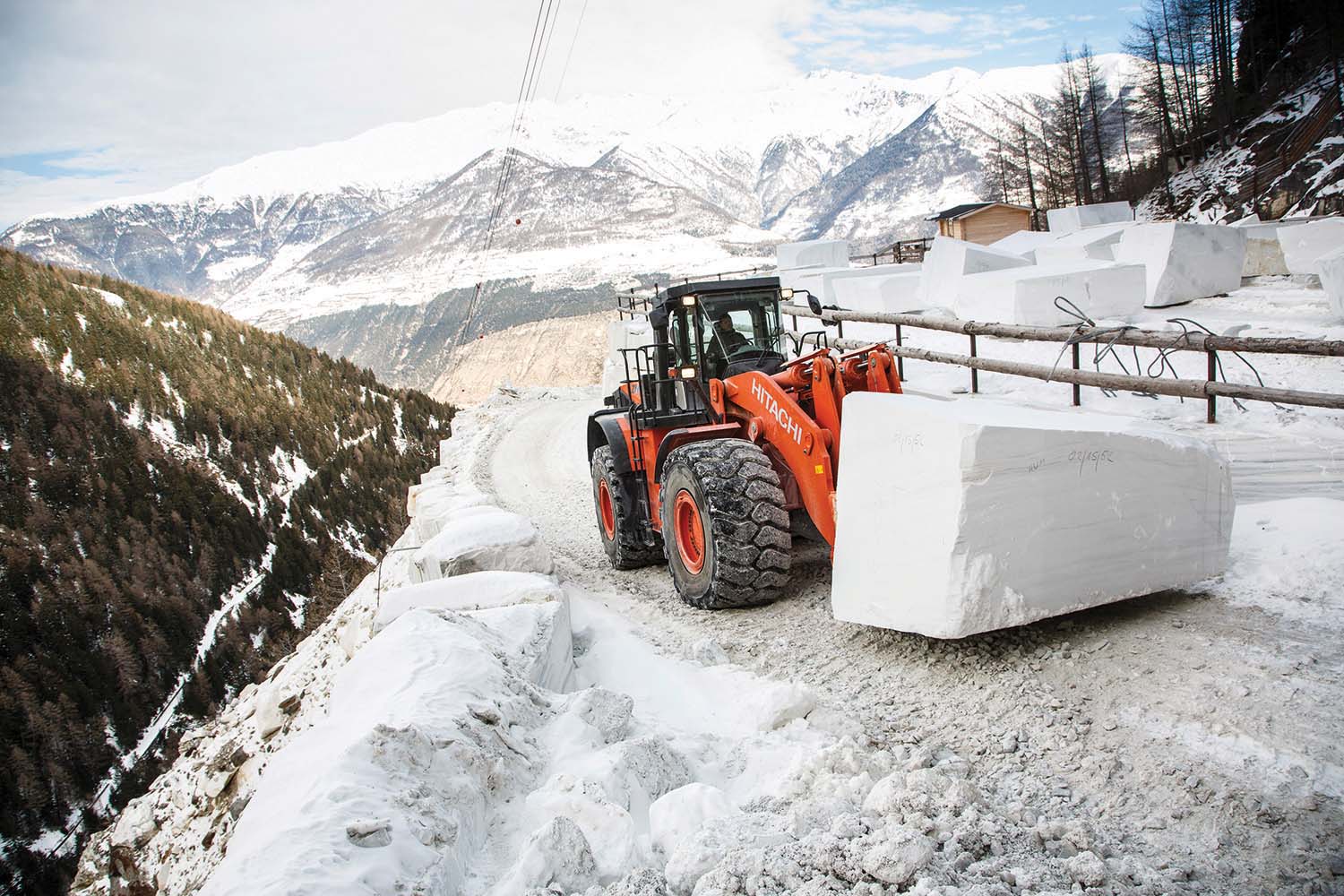
Hitachi wheel loader ZW5550-5
The largest wheel loader in the 233 Hitachi range has been delivered to Lasa Marmo’s Whitewater marble quarry near the village of Laas in northern Italy.
The new ZW550-5’s main function is to lift each marble block that has been extracted from the cavernous site – situated 1,600m above sea level – and transport it through a series of passageways to an outdoor storage area.
The ZW550-5 was delivered in December by Comac, a sub-dealer of the Italian Hitachi dealer for construction machinery, SCAI. The fuel consumption is on average eight litres per hour better than the previous machine, said Erich Tscholl, Lasa Marmo’s operations manager. It was supplied with a bucket and fork attachment, which are used for about 80% of the machine’s operations.
Whitewater quarry is the area’s main source of the 400 millionyear- old metamorphic rock – an exceptionally hard and durable material, which is resistant to harsh and adverse weather conditions. With an estimated 30 million m3 of marble remaining to be quarried over the next 500 years, it is one of the largest natural resources of its kind on the planet. Lasa Marmo has a 30-year lease for Whitewater and two other historic quarries up until 2033.
From 2,000 to 4,500m3 of marble are quarried each year and the company places a strong emphasis on processing the raw materials in Laas. This helps it to contribute to local industry and the region’s artistic traditions, as well as work as a partner with the local authorities for the protection of the area’s natural beauty.
About 40,000m2 of Lasa marble has been used in the new World Trade Center Transportation Hub in New York City and 2,000m2 in Italy’s tallest building, the Torre Isozaki in Milan. Before buying the ZW550-5, Lasa Marmo’s compared three machines across five criteria: purchase price; after-sales service; performance and lifting power; agility and manoeuvrability; and size of the machine.
“The Hitachi’s hydraulics were better and the traction power was stronger – even when travelling up the steepest hill, said Tscholl. “We spoke to the operator of the previous ZW550 model and carried out some tests with the machine, such as travelling fully loaded uphill. Overall, the Hitachi performed better than the other two brands.
Height and width of the machine were among the most important parts of the required specification. “The DPF filter is another essential feature – with less emissions and noise in such a confined space, we were aiming for a better and safer working environment within the site,” he said.
Operator Roland Spechtenhauser said he found the sensitivity of the levers is one of the machine’s strengths. “It does exactly what you want it to do, even to the nearest centimetre.”
It can lift anything on minimum throttle and there is also no difficulty in moving the blocks through narrow spaces or up the steep slopes in the cave, he said. “The automatic gearshift is incredible and could be one of the main reasons for the low fuel consumption.”
The new ZW550-5’s main function is to lift each marble block that has been extracted from the cavernous site – situated 1,600m above sea level – and transport it through a series of passageways to an outdoor storage area.
The ZW550-5 was delivered in December by Comac, a sub-dealer of the Italian Hitachi dealer for construction machinery, SCAI. The fuel consumption is on average eight litres per hour better than the previous machine, said Erich Tscholl, Lasa Marmo’s operations manager. It was supplied with a bucket and fork attachment, which are used for about 80% of the machine’s operations.
Whitewater quarry is the area’s main source of the 400 millionyear- old metamorphic rock – an exceptionally hard and durable material, which is resistant to harsh and adverse weather conditions. With an estimated 30 million m3 of marble remaining to be quarried over the next 500 years, it is one of the largest natural resources of its kind on the planet. Lasa Marmo has a 30-year lease for Whitewater and two other historic quarries up until 2033.
From 2,000 to 4,500m3 of marble are quarried each year and the company places a strong emphasis on processing the raw materials in Laas. This helps it to contribute to local industry and the region’s artistic traditions, as well as work as a partner with the local authorities for the protection of the area’s natural beauty.
About 40,000m2 of Lasa marble has been used in the new World Trade Center Transportation Hub in New York City and 2,000m2 in Italy’s tallest building, the Torre Isozaki in Milan. Before buying the ZW550-5, Lasa Marmo’s compared three machines across five criteria: purchase price; after-sales service; performance and lifting power; agility and manoeuvrability; and size of the machine.
“The Hitachi’s hydraulics were better and the traction power was stronger – even when travelling up the steepest hill, said Tscholl. “We spoke to the operator of the previous ZW550 model and carried out some tests with the machine, such as travelling fully loaded uphill. Overall, the Hitachi performed better than the other two brands.
Height and width of the machine were among the most important parts of the required specification. “The DPF filter is another essential feature – with less emissions and noise in such a confined space, we were aiming for a better and safer working environment within the site,” he said.
Operator Roland Spechtenhauser said he found the sensitivity of the levers is one of the machine’s strengths. “It does exactly what you want it to do, even to the nearest centimetre.”
It can lift anything on minimum throttle and there is also no difficulty in moving the blocks through narrow spaces or up the steep slopes in the cave, he said. “The automatic gearshift is incredible and could be one of the main reasons for the low fuel consumption.”

